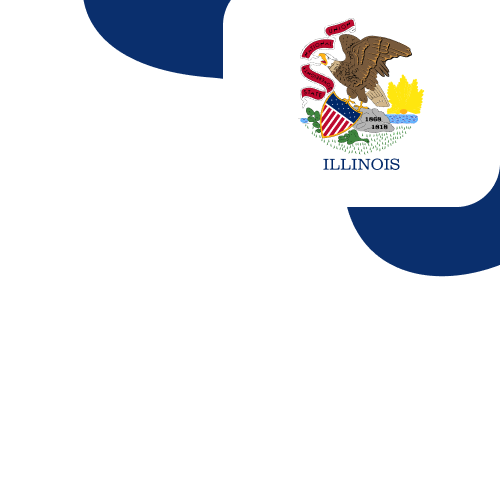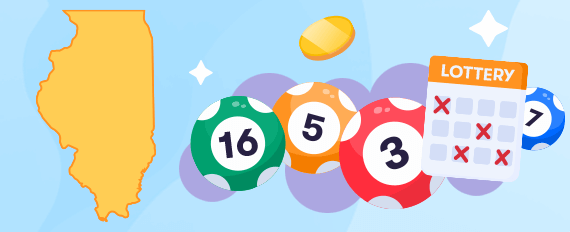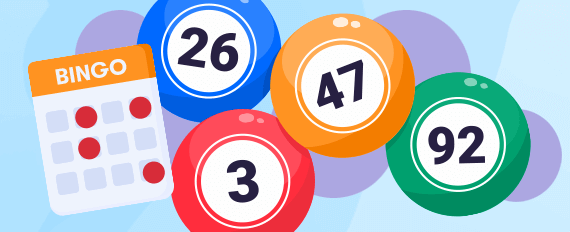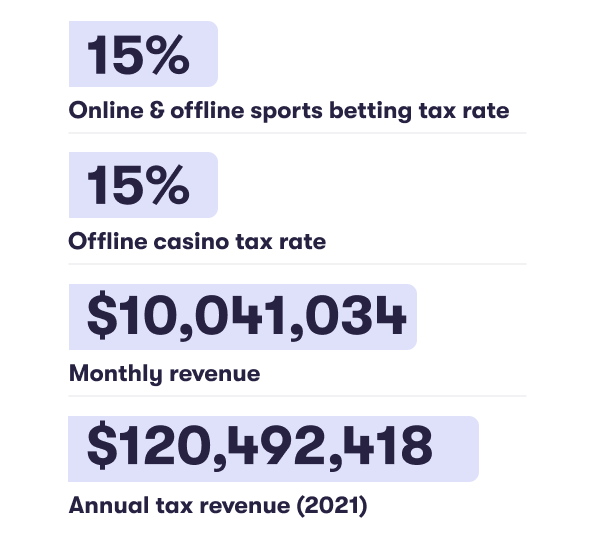
Illinois gambling taxes: everything you need to know in 2025
Illinois considers all gambling winnings taxable income, requiring players to report earnings at both the state and federal levels. While federal law mandates automatic withholding for large wins, Illinois does not withhold state taxes unless specifically requested. This means players must set aside a portion of their winnings to cover tax obligations.
This guide explains when gambling winnings are taxed, how to report them, and what non-residents need to know if they win money in IL.
Are gambling winnings taxable in Illinois?
Yes. All gambling winnings are considered taxable income, regardless of amount. This includes winnings from:
- Land-based and online casinos
- Sports betting and pari-mutuel wagering
- Lotteries and sweepstakes
- Poker tournaments
- Raffles and charitable gaming
- Daily fantasy sports (DFS)
- Sweepstakes and social casinos
The IRS requires all gambling winnings to be reported, regardless of amount. Even small wins — such as a $50 redemption from a sweepstakes casino — are taxable and must be reported on tax returns.
However, federal withholding (24%) only applies if winnings exceed $5,000. If you win less than $5,000, you still owe federal taxes but must report and pay them on your own when filing your tax return.
| Tax type | Rate |
|---|---|
| Federal gambling tax | 24% on winnings over $5,000 (automatic withholding applies) |
| Illinois state tax | 4.95% (self-reported; no automatic withholding) |
If you win big, federal tax withholding may apply immediately, but Illinois does not withhold state tax automatically. Players are responsible for setting aside and paying state taxes when filing their returns.
When are gambling winnings reported and taxed?
The IRS requires gambling operators to issue Form W-2G when winnings exceed specific thresholds. These thresholds vary by gambling type:
| Gambling type | Winnings Reported to IRS (W-2G Required) | Federal Withholding (24%) |
|---|---|---|
| Slot & Bingo | $1,200+ | No automatic withholding (taxes still apply) |
| Keno | $1,500+ (after subtracting wager) | No automatic withholding (taxes still apply) |
| Poker tournaments | $5,000+ (after buy-in deduction) | Withholding applies |
| Sweepstakes, lotteries & wagering pools | $600+ (if payout is 300x wager) | Withholding applies if over $5,000 |
| Horse & dog racing, sports betting | $600+ (if payout is 300x wager) | Withholding applies if over $5,000 |
Even if you do not receive a W-2G form, you are still legally required to report all gambling winnings on your tax return. Federal withholding only applies in certain cases, but the IRS requires ALL gambling income to be reported on Form 1040, Schedule 1.
How to file taxes on gambling winnings in Illinois
Federal Filing (IRS)
- All winnings must be reported on Form 1040, Schedule 1 under “Additional Income.”
- If winnings exceed IRS thresholds, a W-2G form will be issued and must be included in tax filings.
Illinois State Filing
- All gambling winnings must be reported on Illinois Form IL-1040 under taxable income.
- Non-residents who win money in Illinois must file Form IL-1040NR (Illinois Nonresident Tax Return).
Pro tip: Since IL does not automatically withhold state taxes, setting aside at least 5% of your winnings helps you prepare for tax season.
Do non-residents pay Illinois gambling taxes?
Yes. If you live outside Illinois but win money gambling inside the state, you must file Form IL-1040NR and pay the 4.95% state tax.
Keep in mind that:
- IL does not automatically withhold state taxes from non-residents — players must self-report and pay the 4.95% tax.
- Some states offer tax credits for taxes paid to Illinois, while others do not.
- If your home state also taxes gambling winnings, you may owe taxes in both states.
If you win in Illinois but live in a state with a lower tax rate, you may not owe any additional tax since Illinois already taxed your winnings at 4.95%.
Here’s an example: You live in Indiana (tax rate: 3.23%) but win $10,000 in an Illinois casino. Since Illinois already taxed your winnings at 4.95%, Indiana may not require you to pay anything extra. However, if your home state has a higher tax rate (e.g., California’s 13.3%), you may owe the difference between Illinois’ tax rate and your home state’s rate.
Always check with a tax professional to determine if your home state offers tax credits for gambling winnings.
Can losses be deducted from your taxes?
For federal tax, yes. Not for state taxes, however. The rules are differentiated below:
Federal tax rules
- Gambling losses are deductible only if you itemize deductions on Schedule A.
- Losses cannot exceed winnings — you can’t deduct more than you won.
- Proper documentation (betting slips, win/loss statements, bank records) is required.
Illinois state tax rules
- Illinois does not allow gambling loss deductions on state tax returns.
- Even if you qualify for federal deductions, you cannot deduct losses from taxable winnings at the state level.
How to pay gambling taxes in Illinois
If taxes were not withheld, you can make estimated tax payments throughout the year to avoid owing a lump sum during tax season.
- Federal estimated tax payments are made using IRS Form 1040-ES.
- Illinois estimated tax payments are filed using Form IL-1040-ES.
Late payments may result in penalties and interest from the IRS and the Illinois Department of Revenue.
Illinois online gambling sites by type — what’s legal?
Can you gamble online in Illinois? What’s legal when it comes to Illinois online gambling? Up to March 2022, the waters were still quite murky. Sure, you could place an online sports wager, but first, you had to actually visit the retail outlet to register in person.
Now that this requirement is no more, Illinois gambling laws have finally started making more sense. To keep things simple, all you need to know is that online sports betting is perfectly legal, as are online lotteries.
What remains unavailable are real money online casinos and online poker. The Internet Gaming Act is poised to change this state of affairs, but so far it shows no signs of actually being implemented. The good news is that social casinos are freely and legally available.
You do need to be 21 years of age to put down an online sports wager in the Land of Lincoln, although online lotteries are open even to 18-year-olds.
| Gambling vertical | Offline legal age | Online legal age | Online since |
|---|---|---|---|
| Casinos | 21 | n/a | n/a |
| Social casinos | n/a | 21 | June 2019 |
| Sportsbooks | 21 | 21 | June 2019 |
| Social betting apps | n/a | 21 | June 2019 |
| Poker | 21 | n/a | n/a |
| Lottery | 18 | 18 | September 2020 |
| Video gaming terminals | 21 | n/a | n/a |
Illinois betting sites Leagal since 2019
Illinois online gambling was made legal back in June 2019, when Governor J.B. Pritzker officially signed The Sports Wagering Act which opened the doors wide for sports betting in Illinois.
However, the first retail sportsbook wager took almost a full year to become reality, when sports journalist Eddie Olcyzyk made Illinois gambling history by betting $100 on the White Sox at the Rivers Casino on March 9, 2020.
March 2022 happily changed all this, and Illinois online gambling is now official and accessible entirely remotely, even for those seeking to lay down a sports wager for the first time. To date, there are seven online sportsbooks offering legal online gambling in Illinois, offering a variety of markets and betting options.
- Large variety of sports
- Good deals on home teams
- Generous promotions
- No online college betting
Social casinos Legal alternative to casinos
Much like Nevada and the Maryland online gambling landscape, Illinois online casinos have hit a massive stumbling block, with the Illinois Internet Gaming Act remaining frozen in limbo for the foreseeable future.
If you’re wondering how to gamble online in Illinois, there is an alternative. Social and sweepstakes casinos are perfectly legal under Illinois online gambling laws as they do not require real money to play their games.
There is a distinction to be made between social casinos and sweepstakes sites. Platforms like BetRivers.net social casino, for example, operate on a purely ‘just for fun’ basis, which means that you can never win real money playing there. Sites like FortuneCoins sweepstakes casino, on the other hand, also offer real money payouts on specific games, although you will never be obliged to spend your cash before you can play.
Because they’re not strictly classified as gambling, social and sweepstakes casinos don’t require an Illinois Gaming Board license. This means there’s more than plenty to choose from – and to get confused by. It’s worth remembering that since they aren’t regulated, it is even more important to make sure you don’t wind up on a site that’s less than reputable.
Poker at social casinos Legal since 2019
The Illinois gambling landscape is yet to embrace online poker. There are retail poker rooms aplenty, with the likes of BetRivers, the Grand Victoria, and Bally’s Quad Cities renowned for the level of service and the high standards of poker room hosts.
Poker gambling in Illinois also extends to charity poker, which is a very well-organized affair but – alas – also landbased. Organizations like Chicago Charitable Games and Central Illinois Charitable Games host regular weekend tournaments at licensed venues with 10 – 25% of revenue going towards the named charity of the week.
Where does that leave online poker? Much like online casinos, it all depends on when the Internet Gaming Act becomes part of Illinois gambling laws. Until then, many social casinos offer a reasonable portfolio of poker games. The jewel in the crown is undoubtedly BetRivers.net, which impresses with the variety and level of software.
Other forms of gambling in Illinois
Don’t be fooled by the roller-coaster ride that’s been the Illinois gambling journey so far. Residents in the Prairie State love a flutter or two, and not only on sports betting or casino games. Lottery and bingo are both huge, and there is a big tradition of horse racing, with an outing to one of the physical racetracks considered a big day out.
Daily Fantasy Sports (DFS) is also growing consistently after a March 2020 decision by the Illinois Supreme Court determined such games to be based on skill, rather than chance, opening the door wide for operators.

Lottery
The Illinois state lottery has been going strong since 1974, and its online version has now grown into an even bigger mammoth. Although it went online in 2012, the launch of the app in 2014 took it to even higher levels despite generating objections from lottery ticket vendors on the basis of loss of revenue. But this was only a precursor of things to come as, in 2021, the Fast Play lottery platform was introduced.
Bingo
Bingo is easily available at licensed venues across Illinois, however only charitable, educational or religious organizations can apply for a license as long as these operate on a non-profit basis. Because the end purpose is related to charity, the minimum age is reduced from 21 to 18. The game comes with a whole raft of regulations, the most important being that no prize can exceed $5.
Horse-racing
It didn’t really require Illinois gambling laws to legalize sports betting for players in the state to enjoy a spot of wagering on the horse races. Horse-racing enjoys a strong tradition in the Land of Lincoln and, even before 2019, was made legal via the Illinois Racing Board. Wagers could already be placed as early as 1927. They were legally formalized at the state’s two racing tracks in 1975, complete with pari-mutuel wagering, where you can l
Daily Fantasy Sports
May 2020 proved to be a big turning point for Daily Fantasy Sports in Illinois, with the Supreme Court formalizing the legality of head-to-head DFS contests. This successfully overturned a previous 2015 Attorney General advisory memo that had classified DFS games as illegal games of chance that violated state gambling law. Players can specifically thank FanDuel for this, given that the subject of the suit was one of its NBA-based games. If you’reOffline gambling: Riverboat casinos in Illinois
Illinois opened its first riverboat casino in Alton in 1991, a year after the Riverboat Gambling Act made casinos legal, as long as they continuously moved along the river while gambling was taking place.
The first riverboat casino license was granted to the Alton Belle, a spectacular three-deck riverboat with 296 slot machines. Nine other licenses soon followed and revenue from riverboat gambling surpassed that from horse-racing by 1992.
In 1999, a new Riverboat Gambling Act was signed, making it legal for waterway casinos to be permanently docked. Later in 2019, Governor Pritzker signed a law allowing the 10 state casinos to move to actual dry land, thus changing the face of casino gambling in Illinois forever.
Today, four riverboat casinos remain in operation, with the rest operating from normal premises across the Land of Lincoln.
| Riverboat casino | Launch date | Sportsbook |
|---|---|---|
| Grand Victoria Casino Riverboat Resort | 25th October, 1994 | Yes |
| Harrah’s Metropolis Casino & Hotel | 25th February, 1993 | Yes |
| Par-A-Dice Hotel Casino | 14th February, 1992 | Yes |
| HC Aurora | 20th July, 1993 | Yes |
Video gaming terminals in Illinois
2009 saw a further development on the Illinois gambling news front, thanks to the introduction of The Video Gaming Act. This made it legal for a set of licensed establishments to host video gaming terminals (VGTs). The main categories of shops allowed to apply for a license are limited to venues with a liquor license, truck stops, veteran clubs and fraternal organizations.
Today there are over 11,000 video gaming machines scattered around the state, bringing in significant revenue and new business for venue owners. The success of these gaming machines is one of the reasons the Internet Gaming Act in Illinois has met with such controversy and remains stuck in limbo, with VGT operators loath to have to share their revenue with online casino operators.
Ilinois gambling and safety
While online sports betting is fully legal across Illinois, the Prairie State is anything but lax in terms of standards and security. The Illinois Gaming Board (ILGB) regulates all forms of gambling, including retail and remote sports betting, Video Gaming Terminals, land-based, and riverboat casinos.
The ILGB keeps detailed and fully accessible logs of all licensed operators throughout the state, including those who are given a temporary license and those who are still in the pre-licensing stage.
The Illinois Gaming Board will only grant a license if an applicant satisfies every single safety and security requirement. The board collaborates with external entities in order to receive independently audited information about whether an applicant deserves an Illinois license or not.
Top auditors in Delaware
-
Gaming Labs International
-
Illinois Gaming Board
-
BMM Test Labs

-
Eclipse Compliance Testing

Taxation and gambling in Illinois How the state benefits from gambling
Illinois is one of the few states with a flat tax rate on all forms of gambling, which means that landlocked casinos, riverboat casinos, retail sports venues, online sports betting sites and Video Gaming Terminal licensees all pay a 15% tax rate.
In 2021, tax revenue from gambling exceeded the previous year’s figure by 11%. This was massively aided by record lottery sales, which contributed $786 million of the total $136 billion received by the tax department.
The state also makes considerable revenue from the licensing itself, as fees range from $3 to $20 million. There’s also a level of discrimination between offline and standalone online licenses. Thus, for example, a retail sports venue license costs $10 million, while a sports betting operator that doesn’t have an offline venue will pay a hefty $20 million.

FAQs
Do I need to pay taxes on small winnings?
Yes. Even a $50 win from a sweepstakes casino is taxable income and must be reported.
What happens if I win a jackpot?
Winnings over $5,000 are subject to automatic 24% federal tax withholding. Illinois does not automatically withhold state tax, so you must set aside 4.95% yourself.
Do I have to report small winnings?
Yes. Whether you win $50 or $50,000, all gambling income is taxable and must be reported to the IRS. However, the IRS only requires operators to issue a W-2G form if winnings exceed certain thresholds.
- If your winnings are below these thresholds, you must still report them but pay taxes when filing.
- If winnings are above the IRS threshold, the gambling operator will issue a W-2G, and withholding may apply.
Can I deduct gambling losses in Illinois?
Yes, but only on your federal return if you itemize deductions. Illinois does not allow gambling loss deductions on state tax returns.
How do I report gambling winnings from out of state?
If you win money outside Illinois, you must report those winnings on both your federal and Illinois tax returns. You may also owe taxes in the state where you won.
What if I don’t report my gambling winnings?
Failure to report winnings can lead to IRS audits, penalties, and interest charges. The IRS gets copies of W-2G forms, so they know when you win big.
How do I know how much I owe?
If no taxes were withheld, set aside 30% of your total winnings (24% for federal taxes + 4.95% for Illinois state tax).



